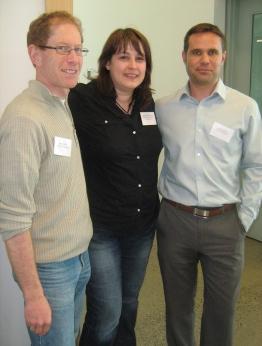For the first time in recent Vancouver history, three neighbourhoods could receive new community plans concurrently, city planners announced on May 7.
More than 75 participants attended the city-hosted gathering of neighbourhood advisory committees, business improvement associations and community groups to discuss specific needs in each of the communities next in line for the new plans: Grandview/Woodlands, Marpole and the West End.
“We think that community planning is a critical part of the city’s work, and we genuinely want to find out ways that we can do it better,” senior city planner Matt Shillito told the gathering. “Rather than make this an internal exercise where we feel that we have all the answers on how to improve the community plan, we are talking to the people who have been involved in the past and are going to be involved in the future.”
“It’s important that we get involved in this process,” agrees Christine Ackermann, director of the West End Residents’ Association. “Otherwise we sit back and complain about what’s going on instead of getting engaged and being a part of the process.”
Affordability, environmental sustainability and the importance of recognizing diversity and inclusivity are integral components the city must consider when drafting a plan for the West End, she says, adding that a longer-term plan than the usual 20 years would be more useful.
Because the West End Residents’ Association has already done a lot of preliminary work to determine the area’s priorities, Ackermann suggests the city could expedite the West End plan — leaving more time for other neighbourhoods.
City planners are now considering how to execute community plans for all three neighbourhoods in tandem. While participants appreciated the importance of delivering plans to all the communities in need, Ackermann expresses concern about a tri-community process. “There are competing neighbourhoods here, and what I don’t like about this process is that it pits neighbourhoods against each other,” she says. “I hope that we can find a way out of that competitiveness.”
“That’s a very important concern,” Shillito acknowledges. He says the city will ensure that the specific needs of each community are met if all three neighbourhoods are approved at once. “We will be recommending to council the needed resources to properly do three and a good job of three,” he says, noting that additional staffing will be required.
For Randy Helten, of the ad-hoc community group West End Neighbours, transparency and trust is of the utmost importance looking toward an updated West End plan.
“The most important principle is enhancing trust,” he says. “If everyone involved has got the commitment to do it in a way that is trustworthy, then things cost a lot less money, they go a lot faster and they work better.”
Helten hopes the information collected during Saturday’s workshop will be valued by the city and shared with the general public. “They’re planting the seeds of trust. But if any of these processes turn out to have had a preordained conclusion, and if they have already come in here with an agenda, then that is going to break the trust down.
“I’m going in with eyes wide open and I’m hopeful, but I’m also cautious,” says Helten, whose organization has vocally opposed the city’s allowing development and rezoning applications in the West End before an updated community plan has been put in place.
“I plan to stay engaged in this,” he promises.
The city is expected to announce in July which neighbourhoods will receive new community plans.

 Why you can trust Xtra
Why you can trust Xtra


